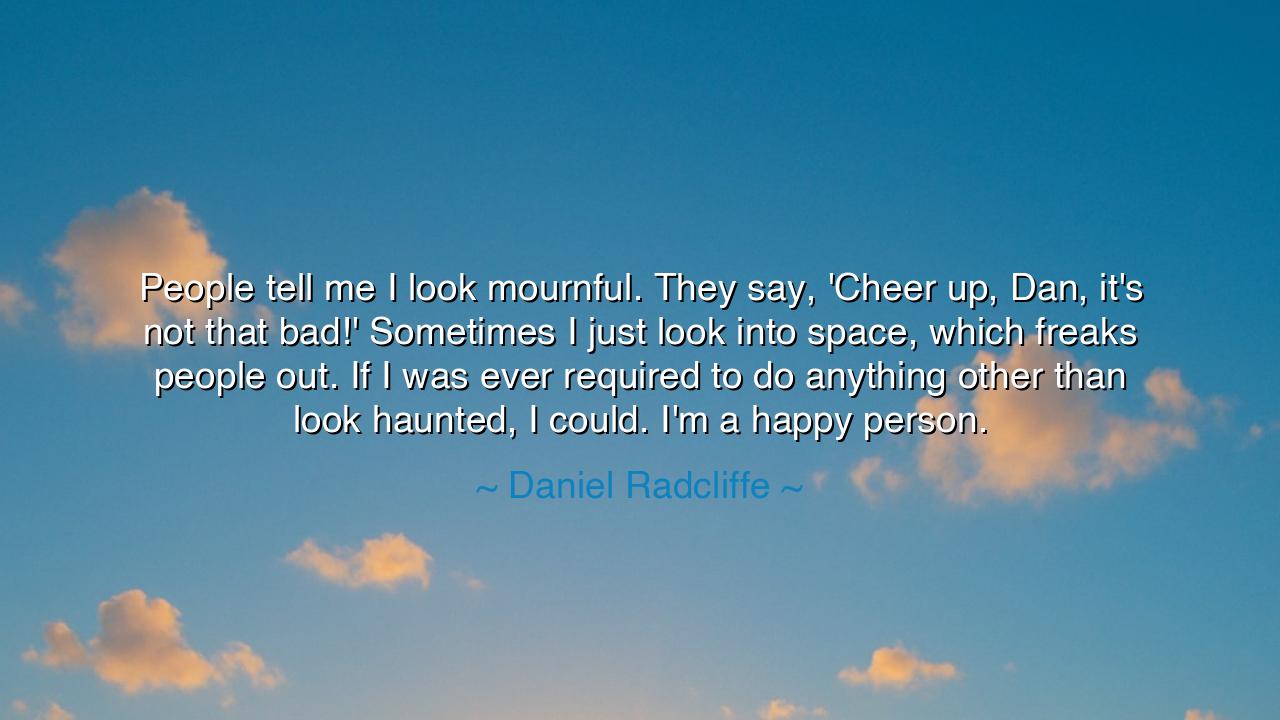
People tell me I look mournful. They say, 'Cheer up, Dan, it's
People tell me I look mournful. They say, 'Cheer up, Dan, it's not that bad!' Sometimes I just look into space, which freaks people out. If I was ever required to do anything other than look haunted, I could. I'm a happy person.






Hear the words of Daniel Radcliffe, spoken with a mixture of candor and irony: “People tell me I look mournful. They say, ‘Cheer up, Dan, it’s not that bad!’ Sometimes I just look into space, which freaks people out. If I was ever required to do anything other than look haunted, I could. I’m a happy person.” Though light in tone, this confession unveils a deep truth about the way men are judged not by their inner spirit, but by the mask their faces seem to wear. In these words lies the ancient struggle between appearance and reality, between what is seen by others and what is truly lived within the soul.
The heart of the quote rests in the tension between mournful appearance and happy reality. Radcliffe reveals that others, seeing his expression, misinterpret his being. They believe him burdened, shadowed, sorrowful, when in truth he is content, joyful, and alive. This is a reminder that the human countenance is no perfect mirror of the heart. The eyes may seem haunted though the soul is at peace; the mouth may smile though despair dwells within. Thus, we must learn to look beyond the surface, for appearances deceive more often than they reveal.
The image of looking into space is especially evocative. To gaze outward, beyond the moment, is a habit of dreamers and thinkers. But to those rooted in daily noise, such gazing appears strange, unsettling, even frightening. Yet history tells us that many of the great souls—philosophers, inventors, poets—spent long hours staring into the void, their silence mistaken for sorrow. Archimedes, deep in thought, seemed absent to those around him, yet in truth he was wandering through worlds of numbers and forms. To be misjudged for looking into space is often the burden of the contemplative spirit.
Consider Abraham Lincoln, whose face seemed carved with melancholy. Those around him often noted his mournful countenance, calling him “the man of sorrows.” Yet within that appearance lived resilience, humor, and a profound strength that carried a nation through its darkest trial. His gaze, faraway and solemn, hid a wit that delighted children and a will that would not bend before ruin. Just as with Radcliffe, the outer expression concealed the deeper truth—the man was not only haunted, but also capable of extraordinary joy and endurance.
The meaning of Radcliffe’s words is not despair, but freedom. He reminds us that our worth is not bound by how others perceive our faces, our gestures, or our silences. We are more than the masks others imagine upon us. He claims his right to be both haunted in expression and happy in spirit, showing that the two are not contradictions but complexities of being human. In this, he joins the voices of all who refuse to be confined by shallow judgments.
The lesson is clear: do not judge others by the shadow of their face, nor assume you know their soul by their silence. Learn to honor the mystery of others, to listen rather than presume. And likewise, do not let yourself be bound by the labels others place upon you. You may look one way and feel another; you may seem haunted, yet carry joy; you may appear weak, yet stand strong. What matters is not the image you cast, but the truth you live.
Practical actions arise from this wisdom. When you meet another, ask before you assume; seek to understand rather than to conclude. When others misjudge you, do not waste yourself in endless defense; let your life and actions reveal the truth over time. Allow yourself to gaze into space, to dream, to reflect, even if it unsettles others. And above all, remember that happiness is not always worn on the face, but cultivated in the heart.
Thus, Radcliffe’s words endure as a playful yet profound teaching: a man may look mournful, yet be deeply happy; he may appear haunted, yet carry light within. Do not confuse the mask with the man, nor the surface with the soul. For beneath every countenance lies a mystery, and to honor that mystery is the beginning of wisdom.






AAdministratorAdministrator
Welcome, honored guests. Please leave a comment, we will respond soon